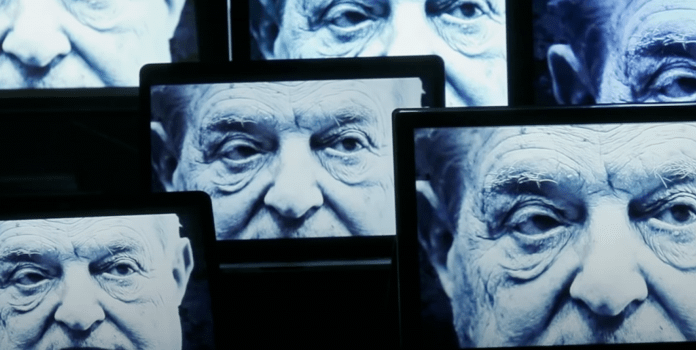(Ken Silva, Headline USA) Billionaire Democrat donor George Soros has announced that a “scheduling conflict” is keeping him from attending the World Economic Forum’s annual meeting in Davos, but the hedge fund tycoon said he’ll be speaking at the upcoming Munich Security Conference—another consequential, if lesser known, gathering of world leaders.
Soros, a frequent speaker at WEF events, made his announcement last week on Twitter, just days before the WEF annual meeting was set to begin in Davos. He said “details [are] to come” about his Munich trip.
The WEF has received more publicity than the annual Munich Security Conference in recent years due to its participants, such as Bill Gates, advocating for COVID-19-related policies such as lockdowns, vaccine mandates, and vaccine passports—all part of what the WEF calls its “Great Reset initiative.” However, the Munich Security Conference has been equally impactful on world events, if not more so.
At last year’s Munich Security Conference, for instance, Ukrainian President Volodymyr Zelenskyy alluded to his country reacquiring nuclear weapons to counter Russia. Five days following Zelensky’s Feb. 19, 2022, speech, Russia invaded Ukraine.
A year before that, President Joe Biden spoke at the Munich event in the weeks after taking office. Biden declared that “America is back” in a bellicose speech in which he pitted the United States and its allies against Russia.
“The Kremlin attacks our democracies and weaponizes corruption to try to undermine our system of governance,” Biden said in Munich in 2021.
Russian President Vladimir Putin has also spoken at Munich Security Conferences before U.S.-Russia relations deteriorated. In 2007, Putin decried the ongoing expansion of NATO in a speech that some observers say portended the current conflict.
“What happened to the assurances our Western partners made after the dissolution of the Warsaw Pact?” Putin asked, referring to promises U.S. leaders made to Russia in the 1990s that NATO would not expand east of Germany.
The Munich Security Conference has also focused on WEF-related themes, such as when Bill Gates spoke there about pandemics in 2017.
“We ignore the link between health security and international security at our peril,” Gates said in an ominous speech three years ahead of the COVID-19 outbreak.
“Whether it occurs by a quirk of nature or at the hand of a terrorist, epidemiologists say a fast-moving airborne pathogen could kill more than 30 million people in less than a year. And they say there is a reasonable probability the world will experience such an outbreak in the next 10-15 years.”
This year’s Munich Security Conference, set to take place Feb. 17-19, is again focused on Russia.
“What does the world look like a year after the beginning of the invasion? Is the war an indicator of a more violent world, in which impunity prevails, the strong do what they can, and the weak suffer what they must? Or can it be a catalyst for a global recommitment to a rules-based international order?” the event’s website asks.
“These and other questions will be at the center of the discussions in Munich.”
Ken Silva is a staff writer at Headline USA. Follow him at twitter.com/jd_cashless.

